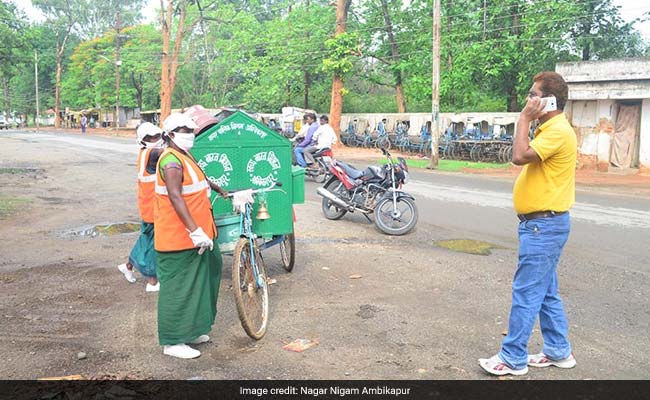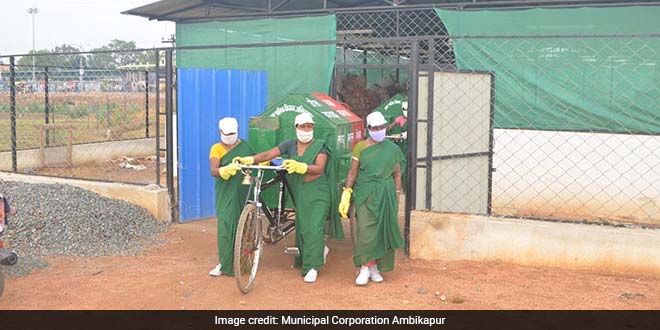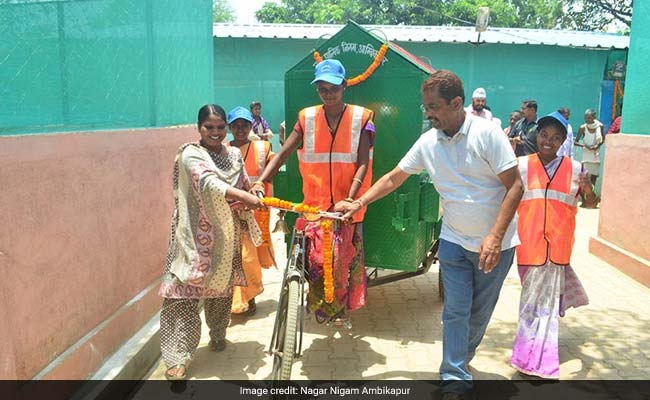Highlights
- Ambikapur is Chattisgarh's cleanest city according to the Swachh Survekshan
- The city has managed to segregate and recycle 90 per cent of its waste
- This system earns the city ₹13 lakhs every month
Chhattisgarh’s cleanest city, Ambikapur, has no open dumping yards, segregates over 90 per cent of its waste and generates ₹13 lakhs every month through its recycling efforts. And all this has been achieved in a short two years thanks to its move towards a decentralised waste management model. In May 2016, the city converted its 15-acre landfill into a ‘Sanitation Awareness Park’ complete with trees and ponds, formally declared itself as a zero-waste city and hasn’t look back ever since.
The incredible thing about Ambikapur’s transformation is how it has managed to get all stakeholders involved in its seamless waste management chain—right from the residents to the ragpickers, everyone has had their part to play in the process.
Also Read: Waste Management By Ragpickers: The Tragic Story Behind India’s Informal Sector
Waste Management: All Hands on Board
“We were drowning in garbage and knew that something had to drastically change. So it was a conscious effort we started in early 2015. We knew that if we wanted a sustainable waste management model we needed one that would be decentralised and focused on segregation. And this was something the municipal corporation could not do alone” Ritesh Saini, IP Officer, Nagar Nigam Ambikapur, tells NDTV.
All of its 2,500 households now practice basic waste generation splitting what they generation into dry and wet garbage. This is then picked up at 7 AM every morning by a team of 403 women armed with white caps and yellow gloves who then cart off this waste to secondary segregation centres, where it is sorted into 38 different categories before being sent off for recycling, composting or other kinds of processing depending on the type.

31 women’s self-employment groups are responsible for Ambikapur’s door-to-door waste collection service
Read More: 100% Waste Segregation: Focus On Behavioural Change And Ragpickers, Say Experts
“The great thing is that everyone is invested. The only mixed waste we get is from public bins. But for the ragpickers, it has been the biggest blessing. The women involved are economically better off while our city is cleaner. Thanks to this, every ragpicker who works for us gets ₹5,000 every month,” says Shashikala Sinha, President, Swachh Ambikapur Mission Cooperative which is the ragpickers’ collective that provides they city’s door-to-door waste collection services.
From Trash to Cash: Getting There
“Not only is our city cleaner but we have also managed to generate revenue through this system. The recycling and composting generates ₹13 lakhs every month and this will only increase,” says Mr Saini.
However, getting to this point required a significant amount of effort. It all started with Nagar Nigam Ambikapur, the city’s civic body, distributing two dustbins to every household to segregate their waste and conducting extensive publicity campaigns to encourage primary source segregation.
“We started on April 14, 2015, and for months would have people go from home to home spreading the message. We tied up with 31 women’s self-help groups for this. They would collect the trash and tell people the importance of segregation,” says Mr Saini.
The effort paid off and by January 2016, all of Ambikapur’s households segregated their waste and were covered by door-to-door collection services. The city also owns 100 garbage pick-up vehicles with separate compartments for the segregated waste as well as 32 e-rickshaws which service its households and commercial centres.
The city also set up 17 secondary waste segregation centres to further sort the 25,000 kilos of waste that was collected from the city’s 48 wards every day.
“The wet waste either converted into compost which we sell or used in biodigesters to make cooking gas. The other waste is sorted into paper, plastic, metal, etc. at these centres. We then send these to the right recycling units according to the type of material,” says Ms Sinha.
Also Read: Top 10 Things To Know About India’s Waste Management Woes
Even products which are made up of different types of material (which are generally considered difficult to recycle) are not tossed away. Instead, they are first sent to plants which separate the different materials which then send them to the recycling centres.
“The idea is that we should not be wasting anything. Only the hazardous waste is not reused in some way. But even this is disposed in a scientific manner,” Mr Saini explains.
The city ranked 15th in the recently released Swachh Survekshan survey which evaluated 434 cities across the country on solid waste collection and management parameters, among other things and was the first city to become open defecation free in the state.
Key statistics of #Ambikapur – India's Cleanest City with a Population under 2 Lakh.#SwachhSurvekshan2017 #SwachhBharat #MyCleanIndia pic.twitter.com/Nib6tL9zi1
— Ministry of Housing and Urban Affairs (@MoHUA_India) May 11, 2017
The city’s example stands out at a time when the central government is just getting ready to promote source segregation as a basic waste management solution across the country.
“The transformation is incredible and we just hope to work towards making this system even more efficient and looking at ways in which we can make more out of our waste,” says Mr Saini
































Alexander Bakhla C/O- Shri Gauri Shankar Singh
August 16, 2017 at 6:33 am
Hi team,
I living in kunkuri chattisgarh its very bad situation no initiative on cleanliness here no waste collection from panchayat please let us know process how i can start some recycle things here in kunkuri